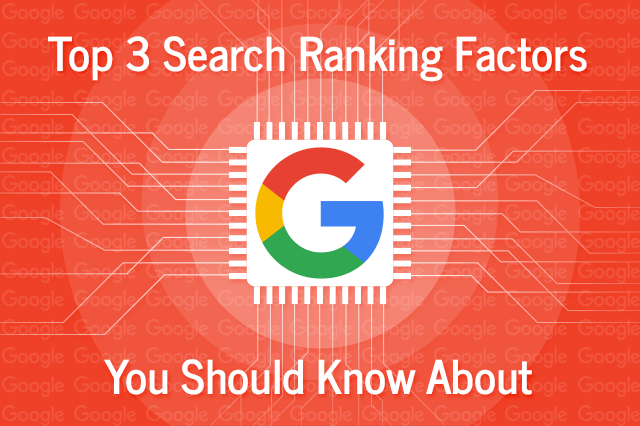Top 3 Search Ranking Factors You Should Know About
 July 26, 2017 | By Ilfusion Team
July 26, 2017 | By Ilfusion Team
Landing on the first page of Google’s search engine results is one of the ultimate marketing goals of many website owners. While Google is keeping mum on what exactly gets you to the top of their SERPs, there are factors unearthed by users that might help you land at the top of the first page. In fact, we’ve discovered some search ranking factors that provide more positive results.
Here are our top three search ranking factors that every website owner should know about:
1. Content
Content has always been king and will remain so for the foreseeable future. For the past several years, Google has been shifting the focus from keyword-centric content towards relevancy and natural language. This means that you don’t need to pepper your content with so many keywords, as long as the web content is relevant and readers can understand it well.
Recently, we’ve found that long-form content is being favored by Google. This means that content that has an in-depth exploration of a certain topic has a better chance of getting to the first page of search engine results.
While there isn’t a specific guideline to follow on the word count, it doesn’t hurt to write a relatively long article that explains the topic. What Google is looking for is that the content correctly answers their users’ questions, resulting in better user experience. Remember, users search in Google because they’re looking for answers.
2. Backlinks
Think of backlinks as character references to your website. The more backlinks your web page has, the better chances that your site is indexed by Google and reach the top page in their SERPs.
However, these backlinks must come from several different authoritative domains. You need to have link diversity and link authority; otherwise, Google will penalize you for bad, questionable, and spammy backlinks.
How do you get backlinks? Two things: create relevant content that your readers will love, and relentlessly promote your content by sharing it on social media and other relevant platforms. This helps you catch the eyes of high-quality and authoritative partners who could and would also willingly share your content on their pages and offer a link back to your site.
3. Mobile Optimization
These days, your online presence depends a whole lot on how well your mobile webpage displays across various devices and screen sizes. Google has been pushing for mobile-first optimization and is in fact favoring mobile-friendly sites when users search from their mobile devices — and sure enough, most people search Google from their mobile phones. Make sure that your website has a responsive web design that fluidly displays well on mobile devices if you want to stay relevant with today’s mobile-first trend.
Another thing to observe is the page load speed of your mobile-friendly website. Google also prioritizes accelerated mobile pages (AMP) in their search engine indexing. Mobile sites that load fast benefit mobile users who are always on the go, which improves user experience. The longer it takes for your web page to load, the higher the bounce rate, which could hurt your search ranking.
Our list above isn’t an official list from Google, nor does it 100% completely assure that your website would get to the top of SERPs when you’ve implemented them to your site. However, one thing you should keep in mind when creating an SEO marketing strategy is to prioritize positive user experience — it’s what Google (and everyone else) really cares about.
If you want to know more about boosting your search engine ranking, or for Ilfusion to help you with your marketing efforts, give us a call at 888-420-5115, or send us an email cr******@******on.com.
Filed in: Featured, Marketing, SEO, Social Media, Web

